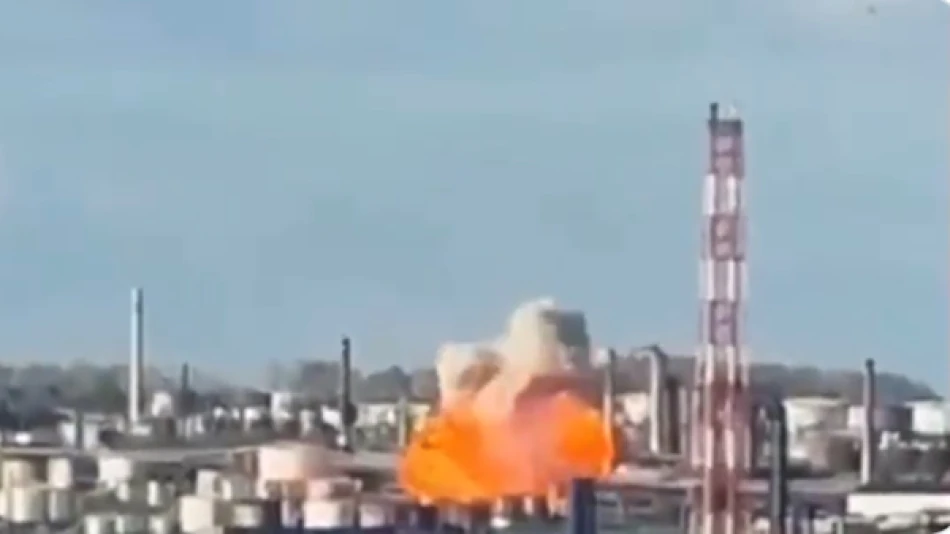
Massive Oil Facility Blaze in Russia after Shelling Incident
Ukraine Strikes Deep: Drone Attack Hits Major Russian Oil Refinery 900 Miles from Border
A Ukrainian drone attack successfully targeted a Bashneft oil refinery in Ufa, Russia on Saturday, demonstrating Kyiv's expanding capability to strike critical energy infrastructure deep within Russian territory. The attack, occurring approximately 1,400 kilometers from the Ukrainian border, represents one of the most distant strikes on Russian energy assets since the conflict began, signaling a potential escalation in Ukraine's strategic bombing campaign.
The Attack Details
Radiy Khabirov, governor of Russia's Bashkiria region, confirmed that Bashneft company suffered what he termed a "terrorist attack by drones" on Saturday. According to his Telegram statement, one drone was shot down over a production site, triggering a fire that emergency crews worked to extinguish. A second drone was also reportedly intercepted.
Local Telegram channels published video footage showing an object flying within the facility grounds, followed by a massive fireball explosion. Despite the dramatic footage, Khabirov claimed damage to the facility was limited and no casualties were reported—though such official statements from Russian authorities have proven unreliable throughout the conflict.
Strategic Significance of the Ufa Strike
Geographic Reach Expansion
The Ufa attack marks a significant milestone in Ukraine's drone warfare capabilities. At 1,400 kilometers from the border, this strike demonstrates that virtually no Russian energy infrastructure is beyond Ukrainian reach. Previous successful attacks on refineries in Ryazan, Tuapse, and other locations were considerably closer to Ukrainian territory.
Economic Warfare Intensifies
Bashneft operates as a major subsidiary of Rosneft, Russia's state oil giant and a crucial revenue source for Moscow's war effort. The company processes significant volumes of crude oil for both domestic consumption and export. Even limited damage to such facilities creates ripple effects through Russia's energy supply chain and export capacity.
Market and Energy Implications
These systematic attacks on Russian refineries serve multiple strategic purposes for Ukraine. First, they directly impact Russia's ability to process crude oil into refined products like gasoline and diesel, creating domestic fuel shortages. Second, they reduce export revenues that fund military operations. Third, they force Russia to divert air defense resources to protect energy infrastructure across its vast territory.
For global energy markets, continued strikes on Russian refining capacity could tighten refined product supplies, particularly affecting regions that rely on Russian fuel exports. However, the impact remains limited compared to crude oil disruptions, as global refining capacity can partially compensate.
Technological and Tactical Evolution
The successful strike at such distance indicates Ukraine has either developed longer-range drone capabilities or established sophisticated logistics networks for launching attacks from within Russian territory. This mirrors Israel's long-range strike capabilities against Iranian facilities, demonstrating how smaller nations can project power asymmetrically against larger adversaries.
Russia's apparent inability to prevent these deep strikes, despite extensive air defense systems, suggests Ukrainian drones are either flying below radar detection or using advanced countermeasures. The pattern resembles successful attacks on Saudi Aramco facilities by Houthi forces, where swarm tactics and low-altitude flight profiles overwhelmed sophisticated defense systems.
Escalation Trajectory
This attack pattern represents a calculated escalation by Ukraine, systematically targeting Russia's economic foundation rather than purely military assets. Unlike Western restrictions on long-range missile strikes, Ukraine faces no limitations on domestically produced drone attacks, giving Kyiv significant operational freedom.
The success of these operations likely encourages further expansion of Ukraine's strategic bombing campaign. With Russian air defenses stretched thin across thousands of kilometers of territory, energy infrastructure remains vulnerable to continued attacks, potentially forcing Moscow to make difficult choices about resource allocation between front-line operations and homeland defense.
Most Viewed News

 Layla Al Mansoori
Layla Al Mansoori






